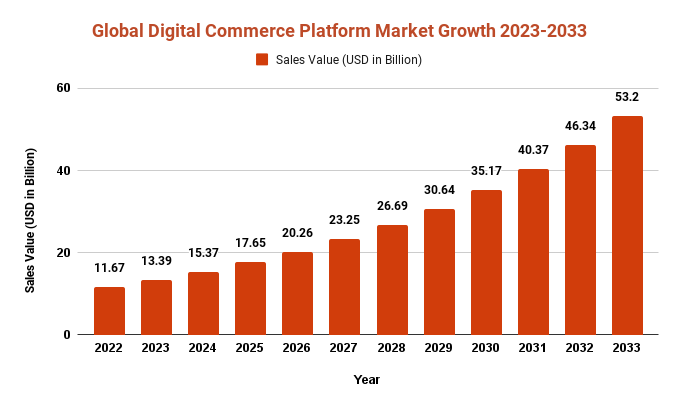Global Digital Commerce Platform Market Set for Rapid Growth to Reach Around USD 53.2 Bn by 2033

Page Contents
Market Overview
Published Via 11Press Digital Commerce Platform Market: Digital commerce platforms are software applications that enable businesses to sell their products or services online. These platforms offer various tools and features for managing online sales, such as product catalogs, shopping carts, payment processing, and order management. Digital commerce platforms Market are commonly utilized by e-commerce businesses, but they can also be beneficial to traditional brick-and-mortar establishments looking to extend their online reach.
The Digital Commerce Platform Market size is expected to reach USD 53.2 Bn by 2033, up from its current value of USD 11.67 Bn in 2022, growing at an annual compound growth rate (CAGR) of 14.79% from 2023-2033.
Digital commerce platforms come in a range of features and functionality, from basic online storefronts to more complex options that offer extensive integrations. Popular examples include Shopify, Magento, WooCommerce, BigCommerce and Squarespace – each providing an array of capabilities for retailers and merchants alike. When selecting a digital commerce platform, businesses should take into account factors like ease of use, customization options, payment processing capabilities, integrations with other tools and services, as well as pricing. Furthermore, ensure the platform can scale as the business grows and develops over time.
Key Takeaways
- Digital commerce platforms are software applications that enable businesses to sell goods and services online.
- These platforms provide a range of tools and features for managing online sales, such as product catalogs, shopping carts, payment processing, and order management.
- Digital commerce platforms come in a range of options, each with their own advantages and drawbacks.
- When selecting a digital commerce platform, businesses should take into account factors like ease of use, customization options, payment processing capabilities, integrations and pricing.
- Digital commerce platforms can be utilized by both e-commerce businesses and traditional brick-and-mortar establishments looking to expand their online presence.
- Digital commerce platforms can aid businesses in reaching new customers, increasing sales, and optimizing the customer experience.
- Technology continues to advance, making digital commerce platforms even more sophisticated and powerful, giving businesses new ways to engage with customers and sell products and services online.

Request For Sample Report Here: https://marketresearch.biz/report/digital-commerce-platform-market/request-sample/
Regional Snapshot
- North America: North America is the leading hub for digital commerce platforms, with the United States at the forefront. Popular platforms such as Shopify, BigCommerce and Magento are widely used throughout this region.
- Europe: Europe is a major market for digital commerce platforms. France, Germany and the United Kingdom are leading the pack here with WooCommerce and Shopify being the two most popular options.
- Asia Pacific: Countries such as Japan, India and China are leading the charge in Asia Pacific when it comes to digital commerce platforms. JD.com, Magento and Alibaba are three of the most popular options within this region.
- Latin America: Brazil is the leading player in Latin America's digital commerce platform market. Popular platforms such as Shopify, Magento and WooCommerce can be found throughout this region.
- Middle East and Africa: Despite being relatively small, the Middle East/Africa region has seen an exponential rise in digital commerce platforms such as Shopify, WooCommerce and Magento.
Drivers
- E-commerce growth is one of the primary forces driving the digital commerce platform market. With online shopping on the rise, businesses must have an online presence in order to remain competitive. Mobile Commerce: As more consumers rely on their phones for online shopping, digital commerce platforms must be optimized for mobile use. Mobile commerce will continue to gain in popularity, necessitating the development of user-friendly platforms.
- Omni-channel retailing is a growing trend among many retailers. This involves selling through multiple channels, such as physical stores, online marketplaces and social media platforms. Businesses can utilize digital commerce platforms to efficiently manage their multi-channel sales strategies. Cloud Computing: Businesses of all sizes now have access to cloud computing, making digital commerce platforms more accessible and cost-effective for everyone. Furthermore, these cloud-based solutions tend to be more flexible and scalable than their on-premise equivalents.
- Artificial Intelligence and Machine Learning; Many digital commerce platforms utilize artificial intelligence or machine learning technologies for personalization, product recommendation, and search purposes. Globalization: Businesses must expand into new markets. To do this, they require digital commerce platforms that support multiple languages, currencies and payment methods. Customer Experience: Businesses strive to enhance customer experience. Digital commerce platforms offer features such as personalized recommendations, fast and secure checkouts, easy returns/exchanges, as well as the capacity for making refunds or exchanges.
Restraints
- Security is one of the primary challenges faced by digital commerce platforms. Cybersecurity threats are on the rise, so businesses must ensure their platforms are safeguarded to protect customers' sensitive information. Many firms rely on multiple systems and platforms for sales and operations management; integrating digital commerce platforms with other applications may prove complex and time-consuming, potentially hindering adoption. While many affordable digital commerce platforms are accessible to small and medium-sized businesses (SMBs), some more advanced options may prove expensive to implement and run effectively. This cost may prove an obstacle for some firms.
- Digital commerce platforms can seem complex to those just starting out in online sales. To ensure successful usage of the platform, businesses should invest in training and support services. With the growth of online sales, there is an increasing likelihood that there will be additional regulations and compliance needs. Businesses must be aware of these obligations and guarantee their digital commerce platforms comply with applicable regulations.
- The digital commerce platform market is highly competitive, with many vendors offering similar features and services. This makes it difficult for businesses to select the ideal platform or vendor in order to stand out from their rivals. Though digital commerce platforms have evolved to incorporate many cutting-edge features and technologies, technical limitations still exist that may limit their capabilities. For instance, some platforms may not be able to handle high traffic volumes or complex integrations.
Do Inquiry About Report Here : https://marketresearch.biz/report/digital-commerce-platform-market/#inquiry
Opportunities
- As previously discussed, digital commerce platforms can leverage artificial intelligence and machine learning technologies to enhance personalization, search, and product recommendations. There is tremendous potential for these platforms to further develop these capabilities in order to provide increasingly tailored experiences for customers. Emerging markets such as Asia, Latin America and Africa are experiencing rapid e-commerce growth which presents new opportunities for these platforms; however they also come with their own set of challenges such as supporting multiple languages and currencies.
- Digital commerce platforms enable businesses to expand their sales reach into new channels such as social media platforms, online marketplaces and chatbots. Platforms have the opportunity to integrate with these channels in order to offer customers a streamlined buying experience. Many businesses are moving toward subscription-based models, which generate recurring income and reliable cash flow. Digital commerce platforms can facilitate subscription management, automate billing and payments for these businesses.
- The B2B e-commerce market is expanding rapidly, creating an opportunity for digital commerce platforms to provide solutions tailored to the specific needs of buyers and sellers in this space. As voice assistants such as Amazon's Alexa and Google Assistant become more commonplace, digital commerce platforms can create voice-enabled shopping experiences. Social media platforms such as Instagram and Facebook are increasingly being utilized as sales channels by businesses. Through digital commerce platforms, businesses can integrate their social media sales with e-commerce operations for a streamlined purchasing experience for customers.
Challenges
- The digital commerce platform market is highly competitive, making it difficult for new entrants to acquire customers. Vendors must invest in marketing and sales strategies in order to raise brand awareness and attract buyers. As businesses expand, they require digital commerce platforms that can scale along with them; however, scaling an existing platform may prove complex and time-consuming if it wasn't designed with this goal in mind. Retaining customers is crucial for any business–particularly digital commerce platforms–so platforms must offer an excellent customer experience to encourage repeat purchases and loyalty from their users.
- As more customer data is collected and used to customize experiences, data privacy becomes an increasingly pressing concern. Platforms must ensure they abide by relevant data privacy regulations while safeguarding customer information. Many businesses possess legacy systems which make integration with modern digital commerce platforms challenging; this may limit their functionality or make adoption difficult for small or medium-sized businesses that lack resources for training or support services. Digital commerce platforms can be complex to use, especially for those without enough resources to invest in training or support services.
- As previously discussed, digital commerce platforms face technical limitations which can limit their capabilities. To overcome these issues and offer customers a superior experience, platforms must continue investing in research and development.
Market Segmentation
By Business Model
- Business to consumer (B2C)
- Business to Business (B2B)
- Consumer to business (C2B)
- Consumer to consumer (C2C)
By Deployment Model
- On-premise
- Software as a service
- Fully Managed
- Open source
By End-user
- Banking, Financial Services & Insurance (BFSI)
- Retail
- IT and Telecommunication
- Airline and Travel
- Others
Key Players
- IBM Corporation
- Oracle Corporation
- Hybris AG
- Demandware, Inc.
- Magento, Inc.
- Digital River, Inc.
- CloudCraze Software LLC
- Apttus Corporation
- NetSuite Inc. and Elastic Path Software Inc.
Report Scope
| Report Attribute | Details |
| Market size value in 2022 | USD 11.67 Bn |
| Revenue forecast by 2033 | USD 53.2 Bn |
| Growth Rate | CAGR Of 14.79% |
| Regions Covered | North America, Europe, Asia Pacific, Latin America, and Middle East & Africa, and Rest of the World |
| Historical Years | 2017-2022 |
| Base Year | 2022 |
| Estimated Year | 2023 |
| Short-Term Projection Year | 2028 |
| Long-Term Projected Year | 2033 |
Growing Demand => Request for Customization
Recent Developments
- Headless commerce is a growing trend in the digital commerce platform market, allowing businesses to decouple the front-end user interface from its back-end engine. This enables companies to craft highly customizable and responsive user experiences across multiple channels.
- As previously discussed, AI and machine learning are increasingly being employed by digital commerce platforms to enhance personalization, search, and product recommendations. This trend is expected to continue as businesses strive to offer more tailored experiences for customers.
- Digital commerce platforms are increasingly expanding into developing nations such as Asia, Latin America and Africa, which are experiencing rapid e-commerce growth. This growth presents new opportunities for both businesses and platforms alike.
- As social media platforms such as Instagram and Facebook become more prominent sales channels, digital commerce platforms are connecting with them in order to offer customers a streamlined purchasing experience.
- There is an emerging trend towards more sustainable e-commerce, with businesses and platforms striving to reduce their carbon footprint and minimize waste. This includes initiatives such as minimizing packaging materials and implementing more eco-friendly shipping practices.
- The digital commerce platform market is highly competitive, with many vendors providing similar features and services. This has led to a trend towards consolidation where larger vendors acquire smaller ones to broaden their product selection and customer base.
- As more consumers shop on their phones, digital commerce platforms are placing greater emphasis on optimizing the user experience for mobile commerce. This includes developing tailored features and functionality tailored specifically for this platform.
Key Questions
Q1. What are the key features and functionalities provided by Digital Commerce Platform?
A digital commerce platform is an online storefront that enables businesses to sell their goods or services online. This storefront includes features such as product listings, images, pricing tables and descriptions for each item sold.
Q2. What is the pricing structure of a Digital Commerce platform?
Pricing structures for digital commerce platforms vary based on who provides them and the features offered. Some platforms offer basic plans with limited capabilities at lower costs, while others provide more comprehensive packages with advanced features at a higher cost.
Q3. What level of technical proficiency is necessary to use the platform?
The required level of technical knowledge required to use a digital commerce platform varies based on its features. Fortunately, most platforms are user-friendly and require minimal knowledge to get started.
Q4. How scalable is the platform, and can it grow with my business as it expands?
Scalability of a digital commerce platform is dependent on its features and design. Most modern platforms are built to be scalable, meaning they can expand along with your business as your needs and customer base grow.
Q5. What type of support and training is provided by the platform vendor?
The level of assistance and instruction offered by digital commerce platform vendors varies based on the platform chosen and specific plans chosen. Most vendors offer some level of assistance to help businesses get started and succeed with their platform.
Q6. How does your platform integrate with other systems and applications?
Many digital commerce platforms provide APIs (Application Programming Interfaces), which enable businesses to link with external programs and systems. APIs enable businesses to retrieve data, automate processes, and integrate with various tools.
Q7. What security and data privacy features does the platform offer?
SSL/TLS Encryption: Many digital commerce platforms provide SSL/TLS encryption to protect data in transit between their website and user's browser, protecting sensitive information like login credentials, credit card numbers, and personal data. This helps safeguard sensitive information such as login credentials, credit card numbers, etc..
Q8. What analytics and reporting features does the platform offer?
Digital commerce platforms provide a range of analytics and reporting tools to help businesses monitor and optimize their performance. Most commonly, these platforms provide sales reports which enable businesses to monitor sales over time.
Q9. How Does the Platform Support Mobile Commerce?
Many digital commerce platforms provide responsive design templates, which automatically adjust the website layout and functionality to fit the screen size and resolution of a user's device. This enables businesses to create one website that works across desktop and mobile platforms simultaneously.
Contact us
Contact Person: Mr. Lawrence John
Marketresearch.Biz (Powered By Prudour Pvt. Ltd.)
Tel: +1 (347) 796-4335
Send Email: [email protected]
The team behind market.us, marketresearch.biz, market.biz and more. Our purpose is to keep our customers ahead of the game with regard to the markets. They may fluctuate up or down, but we will help you to stay ahead of the curve in these market fluctuations. Our consistent growth and ability to deliver in-depth analyses and market insight has engaged genuine market players. They have faith in us to offer the data and information they require to make balanced and decisive marketing decisions.



